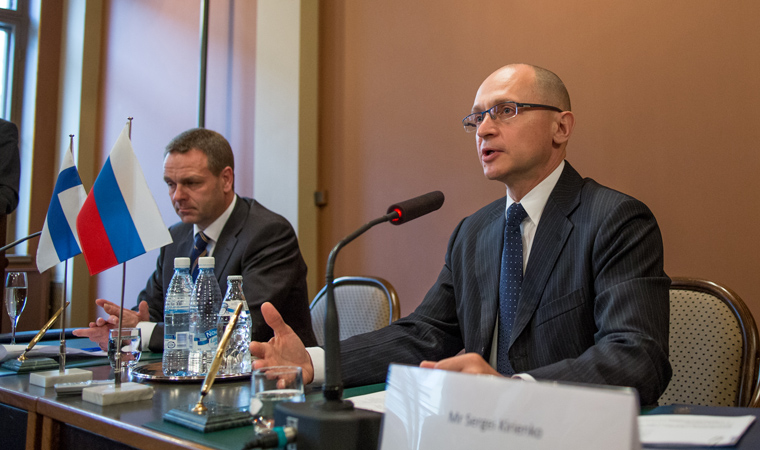
By Common Agreement
back to contentsThe document is very important and will do good for the Fennovoima company and its construction of Hanhikivi. This agreement will help us to regulate responsibility for nuclear damage. The fact that Russia and Finland agreed at this point seems very important to me”.
“Russia and Finland have had a long-term strategic partnership, – said, in his turn, Rosatom’s General Director Sergey Kiriyenko. – In 1971 the construction of Loviisa began. All these years we’ve been having trustful partners’ relations and our cooperation has been expanding, which we are really proud of. The whole world acknowledges Loviisa as the safest station, which is a lot due to the Fortum company, which has been successfully operating it for 30 years already. We are proud, because this is Russian technology. We are also cooperating with Finland in fuel supplying and nuclear medicine”.
Project of particular importance
The Hanhikivi NPP construction project has large benefits for both countries. For Russia it means the acknowledgement of Russian technologies of nuclear power plants design and construction, as well as the possibility to enter the energy market of North Europe. For Finland it will create a new safe, potent and environmentally clean source of electricity, which in future will increase competitiveness of Finnish industry’s exports and create prerequisites for expedite development of Finland’s northern regions.
“The Hanhikivi project is highly important for us, – said Sergey Kiriyenko at the ceremony. – They know quite well in the world that Finland has one of the strictest legislations in safety and ecology. Finns know Russian technologies very well by our operation of Loviisa. Making their decision concerning the station they could have chosen any technology. Their choosing the Russian one we take as the highest trust and appreciate it a great deal. We guarantee the construction of the world’s safest NPP meeting all today’s existing safety requirements. We take this project as trustful and are planning to invest in it. The project, just like any other, is a long-term one (general term of about 100 years), so what is highly important, besides agreements, is a legal base. That’s why the document’s signing today is such a big thing”, – he added.
New horizons
The contract with Fennovoima Oy, signed last December, may have important consequences for Rosatom’s success in Europe and other places. It will show Russia’s powers in building new NPPs to the foreign market, where main European rivals suffer some difficulties right now.
Edward Kee, NERA Economic Consulting Vice President, notes that these days Rosatom has advantages from the point of view of costs, due to state’s efficient support. “The Fennovoima’s deal suggests certain shareholder’s participation of Russia’s State Corporation and proven construction of VVER-type reactor unit, – he says. – It looks like other deals, where Rosatom uses state credits or has outright ownership and long-term contracts for fuel delivery to NPP. Those kinds of deals are possible with state’s support and reference, which Rosatom has; however in case of private NPP supplier it would be complicated or totally impossible”.
Rosatom has become the first supplier of technology which entered Turkish market due to essentially new approach to the contract, according to which Russian Corporation will build, own and operate the Akkuyu NPP. “The Fennovoima Oy agreement is something new, – says Mr. Kee. – It brings the Corporation to a better developed market, with the participation in the Nord Pool (Scandinavian electric energy market) once the construction is finished.
Jeremy Gordon, a WNA analyst, believes that in Finland Rosatom is going to bring together all its successes and achievements in order to demonstrate that it truly is a reliable partner in NPP construction projects – not only at newly appearing markets but also for a more picky potential client, such as EU countries, even with financing. “It seems to me that Russia would really like the process of building for the EU, – says Mr. Gordon. – It has its own technology, its own supply chain, its own R&D and full political-level support; besides, it can offer financing. That’s its strongest commercial reason”.




